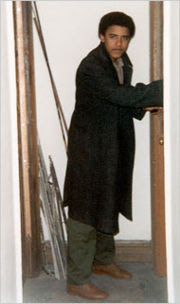 |
| Young Obama in 1981 during his first year at Columbia University. |
What would you do if you knew the top Democrat running for president was lying about his past?
That is the question I was faced with in 2008. I had met the young Barack Obama while he was a sophomore at Occidental College, and I knew that his commitment to socialism was deep, genuine and long-standing.
I had been a leader of the Marxist students at Occidental College myself starting in 1976 when I founded the precursor of the Democrat Socialist Alliance on campus. The young Obama I knew was a Marxist socialist who would have been quite comfortable with Communist party members like his Hawaii mentor Frank Marshall Davis, retired domestic terrorists like Bill Ayers, or active socialist politicians like Illinois State Senator Alice Palmer.
The Obama I knew was nothing like the life-long, pragmatic centrist that he was pretending to be in the 2008 presidential campaign. When I talked politics with the young Obama, he expressed a profound commitment to bringing about a socialist economic system in the U.S. – completely divorced from the profit motive – which would occur, in his lifetime, through a potentially violent, Communist-style revolution. In this context, I saw my report on young Obama as a key piece of evidence suggesting a profound continuity in his belief system.
Although I was surprised by Barack Obama’s insistence on his mainstream ideological credentials, I was shocked that my attempts to spread the news about young Obama’s Marxism failed to gain any media traction during the 2008 presidential campaign with reporters, activists, or campaign staffs.
Once I saw the significance of my face-to-face observations on the young Obama, I went out of my way to get my story on record with the Orange County Register. I tried to contact, among others, Ann Coulter, Sean Hannity, Bill O’Reilly, the folks behind the Swift Boat ads, and the McCain campaign.
I thought I would get a phone call back from Fox News - someone, somewhere – and I still do not understand why no one seemed to catch on to the urgency of the situation. I understand I did not have audio tape of young Obama. I did not have any photos or home movies. Nevertheless, I was extremely active in the leftist politics and counter cultural milieu of Occidental College in the 1970s.
As a younger man, I had earned a Ph.D. in political science from Cornell which, I would think, gave me some credibility in measuring young Obama’s ideological convictions. I quickly saw other people who had known the young Obama were featured in various news articles. It seemed to me I should have been just another interview for any journalist, producer or campaign consultant interested in checking out my story and testing it against the facts.
In frustration, I was also posting what I knew on The Caucus Blog site at the New York Times. My expectation was someone from the Times would call me and follow-up on the leads I was sending out. Here is a sample of what I was doing in October 2008 to get the word out about Obama’s Marxist ideology.
I even thought of scheduling my own press conference on the campus of Occidental College through their campus Republican club. Internally, I was conflicted by the urgency of what I knew and the sense it was best for the story to break out in a manner supportive of the McCain campaign.
What shocked me about my experience in the summer of 2008 is that I thought my background as a Williams College political science professor, as a small business owner, and as a visible presence in the Orange County community would allow my message to immediately go to the very top of the McCain campaign. I thought my story would be welcomed by Fox News.
Since then, things have slowly gotten better. My story on the young Marxist Obama has appeared in Michael Savage’s Trickle-Up Poverty, Paul Kengor’s Dupes, Stanley Kurtz’s Radical-In-Chief and Jack Cashill’s Deconstructing Obama.
Nevertheless, I think there is something broken in our media and campaign system. I do not think most independents or conservatives understand, or fully appreciate, the tremendous advantages the left derives from having the mainstream media serve as the fully paid, completely sympathetic, Dan Rather-level opposition research team of the Democrat party. It is a system that methodically ignores damaging information about flawed candidates like Sen. John Edwards and Rep. Anthony Weiner while routinely elevating minor errors among Republicans to the status of Watergate investigations.
If Republicans are going to win in 2012, I think they need to make some changes so that they are friendlier to the whistle-blowers bringing them bad news about the Obama administration. Personally, I would like to see Republicans create new ways to collect negative news stories on liberals by 1) including web pages requesting opposition research from leakers, 2) establishing guidelines for leakers that help them give campaign decision makers the confidence to pursue appropriate leads, and 3) instituting feedback mechanisms so leakers have some minimal assurance that they have been heard by top campaign managers and that their information has been discarded for technical or strategic reasons and not simply because it was overlooked by a careless staff member.
I think recognition of this problem should be the first step in taking systematic action to prevent flawed Democrat candidates from winning office. In the meantime, I predict we will see more examples of media failure as the left dominates the muckraking journalism profession while the right seems too dependent on a small handful of seemingly obscure, over-worked journalists and – as my case illustrates – unconnected and often baffled citizen activists.
John C. Drew, Ph.D. is an award-winning political scientist.
